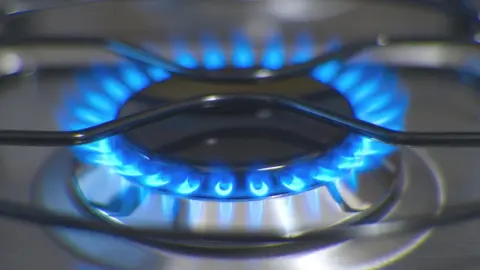British Gas owner Centrica and Shell see profits soar as bills rise
 Getty Images
Getty ImagesBritish Gas owner Centrica and Shell have posted huge profits due to rising energy prices, as UK households face even higher energy bills.
Centrica's half-year profits were five times higher than a year earlier, while Shell reported record profits for the April-to-June period.
It comes as gas prices continue to rise, fuelled by the war in Ukraine.
That is affecting households, with predictions that energy bills will rise even further next year.
The government has said that every household in the UK will get an energy bill discount of £400 this autumn as part of a package of new measures to tackle soaring prices.
But there are calls for more action to help people now, including from personal finance expert Martin Lewis.
British Gas owner Centrica said adjusted operating profit for the six months ending in June rose to £1.34bn from £262m a year earlier.
The rise in profits came from the company's nuclear and oil and gas business, rather than from the British Gas energy supply business which performed much worse. Many firms have been unable to fully pass on the rise in wholesale gas prices to customers.
Centrica has brought back an interim dividend of 1p per share, after scrapping it for the past three years.
The decision to resume payouts to shareholders, even as UK households come under pressure from rising energy bills, has been criticised by some.
Energy analyst David Cox said people would "react against" the sight of an energy company rewarding shareholders, as households struggle with bills.
"Any oil and gas company... that's making a profit and giving some of that back to shareholders at this time, will face a backlash, particularly when we're seeing projections of energy bills hitting almost £4,000," he said.
Mr Cox, who used to work at British Gas, said that the firm had stopped paying a dividend over the past few years as it "didn't have the money" to do so. But it had since made profits in its oil and gas exploration operations, which is why it is re-introducing payouts.
"Businesses are there to make a profit, and dividends are one way of sharing that with shareholders," he said.
But Centrica chief executive Chris O'Shea defended the decision and insisted a lot of the firm's profits were "going back into society".
"I know it's difficult to see the word profits, or dividends, or similar words when people are having a tough time. I'm very conscious of this," he said.
"Bear in mind, over the next couple of years we are expecting to pay a windfall tax of probably well over £600m on our UK gas business off the back of the profits that we're seeing, so a lot of this is going back into society."
 Getty Images
Getty ImagesEnergy giant Shell also reported strong results on Thursday, with second quarter profits of $11.5bn (£9bn).
The company also announced another $6bn share buyback programme for the current quarter, on top of the $8.5bn of shares it bought back in the first half of 2022. But it did not raise its dividend of 25 cents per share.
Frances O'Grady, general secretary of the Trades Union Congress, said soaring profits from Centrica and Shell were "an insult" to people struggling to pay their energy bills.
"Energy bills are rising 23 times faster than wages. We need to hold down profits and boost wages," she said. "Working people are facing the longest and harshest wage squeeze in modern history."
Environmental campaign group Friends of the Earth said the profits reported by both Centrica and Shell would be "greeted with disbelief" by those facing "rocketing energy prices".
"The government must impose a tougher windfall tax on energy firms. The bulk of these profits should be used to insulate our homes and help cash-strapped households pay for their heating this winter, rather than developing more fossil fuel projects that roast the planet."
In May, the government announced a windfall tax on UK oil and gas firms that could raise about £5bn in the next 12 months.
Rising gas prices
Gas prices have risen dramatically because of a worldwide squeeze on energy supplies, and wholesale prices have gone up further because of Russia's invasion of Ukraine.
UK energy bills increased by an unprecedented £700 in April and are likely to keep rising. One management consultancy, BFY, has warned that a typical energy bill could hit £3,850 a year by January, much higher than forecasts earlier this month.
BFY said its forecast reflected the increase in wholesale prices over the past few weeks with the ongoing tensions with Russia sparking concerns over winter supplies.
Many energy suppliers have gone bust over the past year, as they struggled to pass on soaring gas prices to customers. At least 30 energy companies have stopped trading in the UK since August 2021.
British Gas said it added more than 200,000 customers in the first half of the year, including 158,000 customers that it picked up from failed supplier Together Energy.
